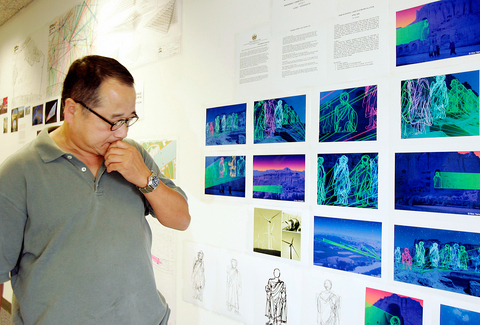When the former Taliban regime in Afghanistan destroyed two 1,600-year-old Buddha statues lining Bamiyan Valley's soaring cliffs, the world shook with shock at the demise of such huge archaeological treasures.
Now, artist Hiro Yamagata plans to commemorate the towering Buddhas by projecting multicolored laser images onto the clay cliffsides where the figures once stood, about 129km west of Kabul.
"I'm doing a fine art piece. That's my purpose -- not for human rights, or for supporting religion or a political statement," said the 58-year-old artist, whose other laser works include a recent display at the Guggenheim Museum in Bilbao, Spain.

PHOTO: AP
Against a canvas of desert darkness, 14 laser systems will project 140 overlapping faceless "statues" sweeping more than 6km across Bamiyan's cliffs in neon shades of green, pink, orange, white and blue. Each image will continuously change color and pattern.
Powered by solar panels and windmills, the 37.5m to 52.5m-high squiggle-style, Day-Glo images -- the same size as the original Buddhas -- would be in stark contrast to the austere, rural valley below.
In March 2001, Taliban militants disregarded worldwide protests and used dynamite and artillery to blow up the 5th century statues, famed for their size and location along the ancient Silk Road linking Europe and Central Asia. The fundamentalist group considered the Buddhas idolatrous and anti-Muslim.
"The destruction of the twin towers and the two Buddhas have been linked as a moment in time," said Robert Brown, 60, an art historian from the University of California, Los Angeles, and a curator of Southeast Asian art at the Los Angeles County Museum of Art.
"Yamagata's lasers obviously have a commemorative notion to them, like the 9/11 memorial in New York," he said.
Afghan government officials first approached Yamagata in 2003 about the project and gave him conditional approval last year, pending a green light from the UN Educational, Scientific and Cultural Organization (UNESCO). The agency has been a prominent presence in Bamiyan, evaluating ways to preserve mural paintings in caves surrounding the Buddhas.
"They are the ones who will make a decision and will advise us," Gulam Sakhi Yousafzai, former acting deputy minister in charge of arts and culture, said in an interview. "They are the experts. We are waiting for their response."
Meanwhile, Yamagata, who estimates his project's cost at up to US$9 million, has been busy amassing funds, materials and workers for his vision from his home-base at an industrial warehouse in suburban Torrance, California.
Shortly after his 2003 meeting with Afghan officials in Tokyo, Yamagata visited Bamiyan and was moved by its orphaned children, squalid living conditions and lack of electricity. He decided then that his artwork should also give something back to the war-torn region.
Of the roughly 140 4,000-kilowatt windmills he plans to ship into Afghanistan for the Bamiyan project, Yamagata said that 100 of them would provide power for surrounding villages. He also wants to hire 40 local young men, typically jobless, to dig foundations for the windmills, starting next March. Completion of the project is set for June 2007.

Kehinde Sanni spends his days smoothing out dents and repainting scratched bumpers in a modest autobody shop in Lagos. He has never left Nigeria, yet he speaks glowingly of Burkina Faso military leader Ibrahim Traore. “Nigeria needs someone like Ibrahim Traore of Burkina Faso. He is doing well for his country,” Sanni said. His admiration is shaped by a steady stream of viral videos, memes and social media posts — many misleading or outright false — portraying Traore as a fearless reformer who defied Western powers and reclaimed his country’s dignity. The Burkinabe strongman swept into power following a coup in September 2022

‘FRAGMENTING’: British politics have for a long time been dominated by the Labor Party and the Tories, but polls suggest that Reform now poses a significant challenge Hard-right upstarts Reform UK snatched a parliamentary seat from British Prime Minister Keir Starmer’s Labor Party yesterday in local elections that dealt a blow to the UK’s two establishment parties. Reform, led by anti-immigrant firebrand Nigel Farage, won the by-election in Runcorn and Helsby in northwest England by just six votes, as it picked up gains in other localities, including one mayoralty. The group’s strong showing continues momentum it built up at last year’s general election and appears to confirm a trend that the UK is entering an era of multi-party politics. “For the movement, for the party it’s a very, very big

ENTERTAINMENT: Rio officials have a history of organizing massive concerts on Copacabana Beach, with Madonna’s show drawing about 1.6 million fans last year Lady Gaga on Saturday night gave a free concert in front of 2 million fans who poured onto Copacabana Beach in Rio de Janeiro for the biggest show of her career. “Tonight, we’re making history... Thank you for making history with me,” Lady Gaga told a screaming crowd. The Mother Monster, as she is known, started the show at about 10:10pm local time with her 2011 song Bloody Mary. Cries of joy rose from the tightly packed fans who sang and danced shoulder-to-shoulder on the vast stretch of sand. Concert organizers said 2.1 million people attended the show. Lady Gaga

SUPPORT: The Australian prime minister promised to back Kyiv against Russia’s invasion, saying: ‘That’s my government’s position. It was yesterday. It still is’ Left-leaning Australian Prime Minister Anthony Albanese yesterday basked in his landslide election win, promising a “disciplined, orderly” government to confront cost-of-living pain and tariff turmoil. People clapped as the 62-year-old and his fiancee, Jodie Haydon, who visited his old inner Sydney haunt, Cafe Italia, surrounded by a crowd of jostling photographers and journalists. Albanese’s Labor Party is on course to win at least 83 seats in the 150-member parliament, partial results showed. Opposition leader Peter Dutton’s conservative Liberal-National coalition had just 38 seats, and other parties 12. Another 17 seats were still in doubt. “We will be a disciplined, orderly